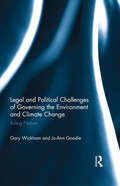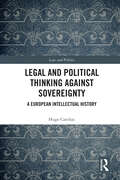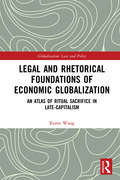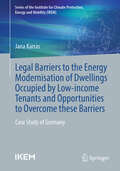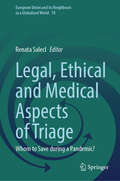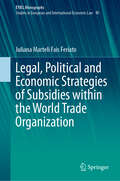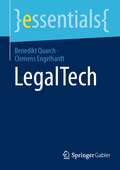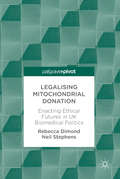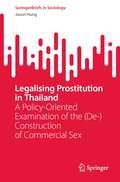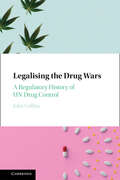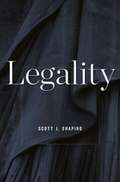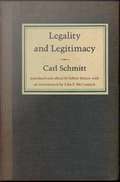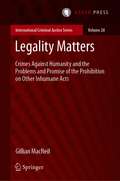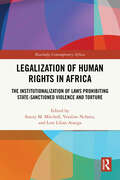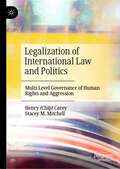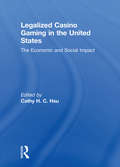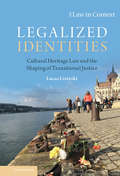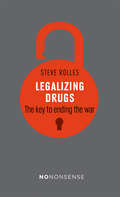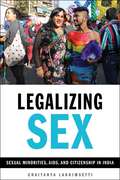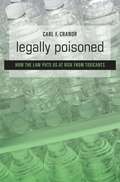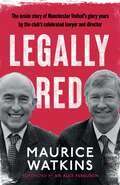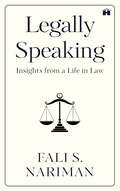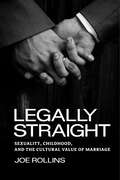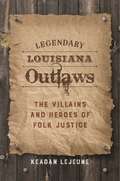- Table View
- List View
Legal and Political Challenges of Governing the Environment and Climate Change: Ruling Nature
by Gary Wickham Jo-Ann GoodieThe environment has not always been protected by law. It was not until the middle of the 20th century that ‘the environment’ came to be understood as an entity in need of special care, and the law-politics duo firmly fixed its focus on this issue. In this book Wickham and Goodie tell the story of how law and politics first came upon the environment as an object in need of special attention. They outline the unlikely intersection of aesthetics and science that made ‘the environment’ into the matter of great concern it is today. The book describes the way private common-law strategies and public-law legislative strategies have approached the task of protecting the environment, and explore the greatest environmental challenge to have so far confronted environmental law and politics; the threat of global climate change. The book offers descriptions of many of the strategies being deployed to meet this challenge and present some troubling assessments of them. The book will be of great interest to students, teachers, and researchers of environmental law, socio-legal studies, environmental studies, and political theory.
Legal and Political Thinking Against Sovereignty: A European Intellectual History (Law and Politics)
by Hugo CanihacAt the intersection of the history of constitutional ideas and of political theory, this book offers a new genealogy of the constitutional thought of the European Union. Centrally, the book traces the emergence and transformation of the ‘post-sovereign thesis’ – an argument that seeks to move beyond the routine opposition between states and European organization, by claiming the concept of sovereignty to be obsolete – and its complicated relationship with liberalism. Analyzing the thought of a series of constitutional thinkers who have developed different versions of this thesis in relation to European integration, the book shows that, far from being new, as is generally assumed, the post-sovereign thesis goes back to the late nineteenth century. Exploring the interplay of these thinkers’ critical conceptualizations of sovereignty and of their views on liberalism, the book argues that, although they shared a concern for the transformation of a world seen as increasingly interdependent, they imagined deeply different versions of post-sovereignty. Bringing this history into focus, the book offers a rich new perspective on contemporary debates about the EU and the possibilities of global constitutionalism. This book will appeal to scholars and students working in the fields of EU and constitutional law, legal history and the history of political thought, as well as others with relevant interests working in political science.
Legal and Rhetorical Foundations of Economic Globalization: An Atlas of Ritual Sacrifice in Late-Capitalism (Globalization: Law and Policy)
by Keren WangThis book examines the subtle ways in which rhetorics of sacrifice have been re-appropriated into the workings of the global political economy in the 21st century. It presents an in-depth analysis of the ways in which ritual practices are deployed, under a diverse set of political and legal contexts, as legitimation devices in rendering exploitative structures of the prevailing political-economic system to appear inescapable, or even palatable. To this end, this work explores the deeper rhetorical and legal basis of late-capitalist governmentality by critically interrogating its mythical and ritual dimensions. The analysis gives due consideration to the contemporary incarnations of ritual sacrifice in the transnational neoliberal discourse: from those exploitative yet inescapable contractual obligations, to calendrical multi-billion dollar 'offerings' to the insatiable needs of 'too-big-to-fail' corporations.The first part of the book provides a working interpretative framework for understanding the politics of ritual sacrifice – one that not only accommodates multidisciplinary, interdisciplinary knowledge of ritual practices, but that can also be employed in the integrated analysis of sacrificial rituals as political rhetoric under divergent historical and societal contexts. The second conducts a series of case studies that cut across the wide variability of ritual public takings in late-capitalism. The book concludes by highlighting several key common doctrines of public ritual sacrifice which have been broadly observed in its case studies. These common doctrines tend to reflect the rhetorical and legal foundations for public takings under hegemonic market-driven governance. They define 'appropriate and proper' occasions for suspending pre-existing legal protections to regularize otherwise transgressive transfers of rights and possessions for the 'greater good' of the economic order.
Legal barriers to the energy modernisation of dwellings occupied by low-income tenants and opportunities to overcome these barriers: Case study of Germany (Schriftenreihe des Instituts für Klimaschutz, Energie und Mobilität)
by Jana KarrasThis book explores the legal barriers to energy modernisation in Germany's residential building sector, especially when low-income tenants are involved. It also examines potential solutions to the landlord-tenant dilemma and how they may be applied within the German legal framework. The book conducts an in-depth examination of the regulations, economic factors, and social dynamics that impede progress in energy efficiency improvements. Drawing upon extensive research, comparative case studies, and insights from the Swedish experiences, this book provides a comprehensive analysis of the challenges and opportunities surrounding the decarbonization of dwellings occupied by low-income tenants in Germany. The book explores the concept of energy poverty in Germany and Sweden, and how these countries address it (or don't) within their legal frameworks. It delves the reader into the complexities of German and Swedish legal systems and how they impact the ability to address energy efficiency in low-income housing. The reader can explore the landlord-tenant dilemma and the hurdles faced when trying to invest in energy modernization, with a special focus on low-income tenants. This book takes an in-depth look at the legal landscape, exploring both EU policies and national regulations. Sweden's experience, especially its use of municipal green bonds to finance energy transition projects, offers a valuable lesson for Germany. Drawing on comparative insights from Sweden, which has made strides in addressing similar issues, the book aims to identify transferable legal strategies to facilitate energy transition in the rental housing market. By dissecting the intricacies of regulations and legal frameworks, this book offers innovative solutions that can bridge the gap between climate goals and the realities faced by low-income tenants. This book is intended for a diverse audience, including policymakers, legal professionals, researchers, academics, environmentalists, housing authorities, and advocates for social and climate justice. It serves as an essential resource for those seeking a deeper understanding of the legal complexities surrounding energy modernization in low-income tenant-occupied dwellings and the pathways to surmount these barriers. It serves as a comprehensive resource for those dedicated to dismantling legal barriers to energy efficiency and advancing social and environmental equity.
Legal, Ethical and Medical Aspects of Triage: Whom to Save during a Pandemic? (European Union and its Neighbours in a Globalized World #18)
by Renata SaleclTriage decision-making during a pandemic is linked to complex ethical, medical, and legal dilemmas, which in the past have been discussed mainly based on hypothetical scenarios. The crisis caused by Covid-19 has shown these dilemmas to be very real, and many countries faced significant health care challenges during the pandemic. The book presents different views on the problems of triage during the time of Covid-19 and to shed a light on how various countries approached triage during the pandemic. The absence of staff and resources in many countries opened a discussion of whether they should strive for the most egalitarian way of deciding whom to help with limited resources or to act in a utilitarian manner and establish a triage system based on saving as many people as possible. There were so-called conflicts of duty in many parts of the world, and decision-makers who had to choose which patients would survive in the absence of resources were under tremendous pressure. This book presents different views on the issue of such decision-making from legal, ethical, and medical points of view. The authors explain the origin of the concept of triage and its use in modern medicine. They point out the distinction between triage and the allocation of resources while also analysing how pandemic triage differs from emergency and disaster triage.
Legal, Political and Economic Strategies of Subsidies within the World Trade Organization (European Yearbook of International Economic Law #40)
by Juliana Marteli Fais FeriatoFrom the Law and Economics perspective, the book reveals the gaps of the trade multilateral system that allows governments to draw upon subsidies strategies according to their unilateral interests. The book suggests that failures in WTO mechanisms has become great challenge for the multilateral system to restrain trade diversion. Due to their character as public expenditures, since they are granted by governments through tax incentives or direct financial investment, granting subsidies are directly linked to the economic power of the countries. For this reason, some subsidies constitute a serious unfair trade practice that needs to be fought multilaterally, depending on global cooperation so that all countries can have access to international trade. Poor countries are severely affected by theses practices, meanwhile, not all developing countries are impacted the same way because there are considerable levels of development. Based on this, the book proposes a preventive mechanism to discourage subterfuge and opportunism of rich countries, in search of efficiency. In order to do so, firstly, it will be addressed the economic theories that underlie free trade, and the subsidies influence over international economy. Next, the Law and Economics approach will be presented, by which the problematic economic and political subsidy strategies of member countries will be analyzed. Based on these premises, the book shows how subsidies and countervailing measures are regulated within the WTO and it points out the failures of the WTO mechanisms to combat specific subsidies, which accentuate the differences between rich and poor countries. Finally, the book proposes preventive measures to hinder harmful effects of subsidies from materializing.
LegalTech (essentials)
by Clemens Engelhardt Benedikt QuarchDas essential vermittelt einen Überblick über den LegalTech-Markt, seine Akteure, Herausforderungen und Vorteile sowie Investionsmöglichkeiten. LegalTech ist derzeit in aller Munde und es haben sich auf dem europäischen Markt zahlreiche Unternehmen etabliert, die die Rechtsdurchsetzung digitalisieren und sowohl Verbraucher:innen als auch Anwält:innen helfen, effizienter zu arbeiten. Dabei ist LegalTech als wichtiger Teil des Fortschritts nicht mehr aus dem Rechtsmarkt wegzudenken.
Legalising Mitochondrial Donation: Enacting Ethical Futures In Uk Biomedical Politics
by Rebecca Dimond Neil StephensIn 2015 the UK became the first country in the world to legalise mitochondrial donation, a controversial germ line reproductive technology to prevent the transmission of mitochondrial disease. Dimond and Stephens track the intense period of scientific and ethical review, public consultation and parliamentary debates preceeding the decision. They draw on stakeholder accounts and public documents to explore how patients, professionals, institutions and publics mobilised within ‘for’ and ‘against’ clusters, engaging in extensive promissory, emotional, bureaucratic, ethical, embodied and clinical labour to justify competing visions of an ethical future. They describe how this decision is the latest iteration of a UK sociotechnical imaginary in which the further liberalization of human embryo research and use is rendered legitimate and ethical through modes of consultation and permissive but strictly regulated licensing. Overall, this book presents a timely, multi-dimensional, and sociological account of a globally significant landmark in the history of human genetics, and will be relevant to those with an interest in genetics, Science, Technology and Society, the sociology of medicine, reproductive technology, and public policy debate.
Legalising Prostitution in Thailand: A Policy-Oriented Examination of the (De-)Construction of Commercial Sex (SpringerBriefs in Sociology)
by Jason HungThis book problematises the socioeconomic and institutional construction of prostitution in Thai contexts, identifying the root causes that propel underprivileged, discriminated and deprived women and girls to enter the sex industry. The author considers Thailand’s tolerance of prostitution and sex trafficking, despite criminalising prostitution since 1960. In doing so, they explain how criminalising prostitution does not lower the odds of women and girls engaging in commercial sex, but rather, legally marginalises them from receiving the necessary social and healthcare support. The book highlights that neither can Thailand pragmatically practice a zero-tolerance stance against prostitution - primarily due to severe police corruption and its heavy reliance on the sex tourism economy to support the national economic growth - nor is Thailand willing to fully crack down on the domestic sex industry. Engaging in an evaluation of how legalising and decriminalising prostitution, along with continuing to implement policies and interventions that alleviate the root causes of prostitution, can help Thailand build a more inclusive society and less-prostitution-reliant economy in the long term, the book provides a nuanced understanding of the relationships between society, inequality, governance, criminality, and policy in Southeast Asian contexts. It is relevant to students and researchers in sociology, socio-criminology, public policy, government and Southeast Asian studies.
Legalising the Drug Wars: A Regulatory History of UN Drug Control
by John CollinsWhere did the regulatory underpinnings for the global drug wars come from? This book is the first fully-focused history of the 1961 UN Single Convention on Narcotic Drugs, the bedrock of the modern multilateral drug control system and the focal point of global drug regulations and prohibitions. Although far from the propagator of the drug wars, the UN enabled the creation of a uniform global legal framework to effectively legalise, or regulate, their pursuit. This book thereby answers the question of where the international legal framework for drug control came from, what state interests informed its development and how complex diplomatic negotiations resulted in the current regulatory system, binding states into an element of global policy uniformity.
Legality
by Scott J. ShapiroWhat is law? In this book, Scott Shapiro draws on current work in the theory of action to offer an original and compelling answer to this perennial philosophical question.
Legality And Legitimacy
by Carl SchmittCarl Schmitt ranks among the most original and controversial political thinkers of the twentieth century. His incisive criticisms of Enlightenment political thought and liberal political practice remain as shocking and significant today as when they first appeared in Weimar Germany. Unavailable in English until now, Legality and Legitimacy was composed in 1932, in the midst of the crisis that would lead to the collapse of the Weimar Republic and only a matter of months before Schmitt's collaboration with the Nazis. In this important work, Schmitt questions the political viability of liberal constitutionalism, parliamentary government, and the rule of law. Liberal governments, he argues, cannot respond effectively to challenges by radical groups like the Nazis or Communists. Only a presidential regime subject to few, if any, practical limitations can ensure domestic security in a highly pluralistic society. Legality and Legitimacy is sure to provide a compelling reference point in contemporary debates over the challenges facing constitutional democracies today. In addition to Jeffrey Seitzer's translation of the 1932 text itself, this volume contains his translation of Schmitt's 1958 commentary on the work, extensive explanatory notes, and an appendix including selected articles of the Weimar constitution. John P. McCormick's introduction places Legality and Legitimacy in its historical context, clarifies some of the intricacies of the argument, and ultimately contests Schmitt's claims regarding the inherent weakness of parliamentarism, constitutionalism, and the rule of law.
Legality Matters: Crimes Against Humanity and the Problems and Promise of the Prohibition on Other Inhumane Acts (International Criminal Justice Series #28)
by Gillian MacNeilThis book examines the way international criminal courts and tribunals have interpreted the crimes against humanity proscription of other inhumane acts. This clause is consistently used in spite of the long list of more specific offences forbidden as crimes against humanity. The volume proposes that the current approach is based on a misunderstanding of the nature of the clause. Properly understood, the clause is an invitation to courts to create and apply retroactive criminal laws. This leads to a problem. A prohibition on the use of retroactive criminal laws, one which admits no exceptions, is deeply embedded in international law. The author argues that it is time to revisit the assumption that retroactive criminal laws can never be deployed in a fair legal system. Drawing lessons from an exploration on the way the prohibition on retroactive laws is applied in practice, she proposes a new framework for understanding the clause proscribing the commission of other inhumane acts. This book will be of relevance to anyone interested in international criminal law or criminal law theory. Gillian MacNeil is Assistant Professor at Robson Hall, the Faculty of Law of the University of Manitoba in Winnipeg, Canada.
Legalization of Human Rights in Africa: The Institutionalization of Laws Prohibiting State-Sanctioned Violence and Torture (Routledge Contemporary Africa)
by Stacey M. Mitchell Veraline Nchotu Lem Lilian AtangaMost countries on the African continent have ratified or acceded to several human rights treaties, including the Torture Convention and the African Charter on Human and People’s Rights. This book assesses the progress African countries have made in institutionalizing human rights laws prohibiting torture, extrajudicial killings, and disappearances domestically.States ratify human rights treaties for a variety of reasons. Some commentators defend an honest sincerity of purpose, whereas others might point to material incentives. The contributors to this volume go beyond the ratification puzzle to instead reframe legalization according to Lon Fuller’s conceptualization of congruence. Congruence is an interactive variable that measures the continuous efforts of government and the public to shape the law and its implementation. By reframing legalization as an ongoing process, the model created by the authors is used to test several hypotheses about what impacts legalization in Africa more broadly, and in countries such as Mali, Cameroon, Botswana, Zimbabwe, and Tunisia, more specifically. The contributors to this volume demonstrate that the legalization of human rights is never a finished product, but is a moving target influenced by exogenous and endogenous phenomena.This volume is useful for researchers of genocide, human rights, and atrocity prevention, as well as for those interested in legalization and democratization both within Africa and other regions of the world.
Legalization of International Law and Politics: Multi-Level Governance of Human Rights and Aggression
by Stacey M. Mitchell Henry (Chip) CareyThis book provides an expanded conceptualization of legalization that focuses on implementation of obligation, precision, and delegation at the international and domestic levels of politics. By adding domestic politics and the actors to the international level of analysis, the authors add the insights of Kenneth Waltz, Graham Allison, and Louis Henkin to understand why most international law is developed and observed most of the time. However, the authors argue that law-breaking and law-distorting occurs as a part of negative legalization. Consequently, the book offers a framework for understanding how international law both produces and undermines order and justice. The authors also draw from realist, liberal, constructivist, cosmopolitan and critical theories to analyse how legalization can both build and/or undermine consensus, which results in either positive or negative legalization of international law. The authors argue that legalization is a process over time and not just a snapshot in time.
Legalized Casino Gaming in the United States: The Economic and Social Impact
by Cathy Hc HsuCovering the entire United States gaming market, Legalized Casino Gaming in the United States provides gaming researchers, policymakers, and hospitality students comprehensive overview of the history, development, legislation, and economic and social impacts of riverboat, land-based, and Native American casino gaming. Containing national and regional research about the industry, this book will provide students with a historical view on gaming and the hospitality industry, offer researchers data and current market status of the industry; and will give policymakers information about the advantages and disadvantages of a gaming industry in their community.Comprehensive and thorough, Legalized Casino Gaming in the United States is full of case studies, data, and surveys that provide you with credible information on community incomes, residents’attitudes about gaming, and gaming taxes in certain states. This fact-filled book will help you evaluate and learn about the pros and cons of the industry, including: reviewing changes in the gaming laws and regulations in particular regions and segments of the industry explaining laws and regulations by state for riverboat and other Native American land-based gaming examining negative and positive social impacts of gaming, including crime; quality of life; community services; availability of entertainment, recreation, and cultural activities; community attractiveness, such as reputation, appearance, cleanliness, and traffic; local resident attitudes; and pathological gaming explaining Nevada’s gaming regulatory system, including the roles of the Nevada Gaming Commission and Gaming Control Board, and discussing issues related to currency transactions, exclusion lists, work permits, customer disputes, and underage gambling discussing positive economic aspects of Native American gaming, such as tax benefits, in Connecticut, Wisconsin, Oregon, and Minnesota, and how the industry impacts surrounding communitiesExamining the industry from ethical, economic, and social standpoints, the contributors offer you several perspectives of a situation, not just one side of an issue, to help you make educated decisions or opinions about gaming. Bolstered with charts, graphs, tables, and future research recommendations, Legalized Casino Gaming in the United States offers you an in-depth and comprehensive look at the gaming industry, helping you weigh the positive and negative effects of one of the most popular areas of hospitality.
Legalized Identities: Cultural Heritage Law and the Shaping of Transitional Justice (Law in Context)
by Lucas LixinskiCultural heritage is a feature of transitioning societies, from museums commemorating the end of a dictatorship to adding places like the Auschwitz-Birkenau concentration camp to the World Heritage List. These processes are governed by specific laws, and yet transitional justice discourses tend to ignore law's role, assuming that memory in transition emerges organically. This book debunks this assumption, showing how cultural heritage law is integral to what memory and cultural identity is possible in transition. Lixinski attempts to reengage with the original promise of transitional justice: to pragmatically advance societies towards a future where atrocities will no longer happen. The promise in the UNESCO Constitution of lasting peace through cultural understanding is possible through focusing on the intersection of cultural heritage law and transitional justice, as Lixinski shows in this ground-breaking book.
Legalizing Drugs: The key to ending the war (No-Nonsense Guides #3)
by Steve RollesThe question is no longer if we should end the war on drugs but how we do it. This No-Nonsense Guide counts the human and financial cost of fifty years of drug war – and proceeds to outline a better way, looking at where drug law reform is already working, how to overcome the obstacles to reform, and what a post-drug war world might look like.
Legalizing Sex: Sexual Minorities, AIDS, and Citizenship in India
by Chaitanya LakkimsettiHow the rise of HIV in India resulted in government protections for gay groups, transgender people, and sex workers This original ethnographic research explores the relationship between the HIV/AIDS epidemic and the rights-based struggles of sexual minorities in contemporary India. Sex workers, gay men, and transgender people became visible in the Indian public sphere in the mid-1980s when the rise of HIV/AIDS became a frightening issue. The Indian state started to fold these groups into national HIV/AIDS policies as “high-risk” groups in an attempt to create an effective response to the epidemic. Lakkimsetti argues that over time the crisis of HIV/AIDS effectively transformed the relationship between sexual minorities and the state from one that was focused on juridical exclusion to one of inclusion. The new relationship then enabled affected groups to demand rights and citizenship from the Indian state that had been previously unimaginable. By illuminating such tactics as mobilizing against a colonial era anti-sodomy law, petitioning the courts for the recognition of gender identity, and stalling attempts to criminalize sexual labor, this book uniquely brings together the struggles of sex workers, transgender people, and gay groups previously studied separately. A closely observed look at the machinations behind recent victories for sexual minorities, this book is essential reading across several fields.
Legally Poisoned: How the Law Puts Us at Risk from Toxicants
by Carl F. CranorTake a random walk through your life and you’ll find it is awash in industrial, often toxic, chemicals. Sip water from a plastic bottle and ingest bisphenol A. Prepare dinner in a non-stick frying pan or wear a layer of Gore-Tex only to be exposed to perfluorinated compounds. Hang curtains, clip your baby into a car seat, watch television—all are manufactured with brominated flame-retardants. Cosmetic ingredients, industrial chemicals, pesticides, and other compounds enter our bodies and remain briefly or permanently. Far too many suspected toxic hazards are unleashed every day that affect the development and function of our brain, immune system, reproductive organs, or hormones. But no public health law requires product testing of most chemical compounds before they enter the market. If products are deemed dangerous, toxicants must be forcibly reduced or removed—but only after harm has been done. In this scientifically rigorous legal analysis, Carl Cranor argues that just as pharmaceuticals and pesticides cannot be sold without pre-market testing, other chemical products should be subject to the same safety measures. Cranor shows, in terrifying detail, what risks we run, and that it is entirely possible to design a less dangerous commercial world.
Legally Red: With a foreword by Sir Alex Ferguson
by Maurice WatkinsAt Old Trafford, in the corridors of power, Maurice Watkins was the guiding force. As the club solicitor, and later a director, for thirty-six years he was the man to whom Manchester United turned to negotiate the legal minefields. In his autobiography, written before his passing in 2021, the layers of secrecy are peeled back to expose the brilliance of a character who shaped the club's destiny.From the sacking of Tommy Docherty, through the late-night drive to Scotland to lure Alex Ferguson to the hot seat, to the courtroom defence of Eric Cantona for his 'kung-fu kick' on an abusive fan, Maurice Watkins was the key figure behind the scenes at United. Yet he was also front and centre for the triumphs under Ferguson and the rise of players such as David Beckham and Cristiano Ronaldo. Later, a lifelong love of sports made him a natural for leadership roles throughout the sporting world.Legally Red takes you into the boardroom of one of the greatest football clubs in the world in one of its most successful eras. But, ultimately, it's a story that goes beyond the legal battles of Manchester United. It reveals the human stories, heroics and heartaches that shaped Watkins's remarkable journey.
Legally Red: With a foreword by Sir Alex Ferguson
by Maurice WatkinsAt Old Trafford, in the corridors of power, Maurice Watkins was the guiding force. As the club solicitor, and later a director, for thirty-six years he was the man to whom Manchester United turned to negotiate the legal minefields. In his autobiography, written before his passing in 2021, the layers of secrecy are peeled back to expose the brilliance of a character who shaped the club's destiny.From the sacking of Tommy Docherty, through the late-night drive to Scotland to lure Alex Ferguson to the hot seat, to the courtroom defence of Eric Cantona for his 'kung-fu kick' on an abusive fan, Maurice Watkins was the key figure behind the scenes at United. Yet he was also front and centre for the triumphs under Ferguson and the rise of players such as David Beckham and Cristiano Ronaldo. Later, a lifelong love of sports made him a natural for leadership roles throughout the sporting world.Legally Red takes you into the boardroom of one of the greatest football clubs in the world in one of its most successful eras. But, ultimately, it's a story that goes beyond the legal battles of Manchester United. It reveals the human stories, heroics and heartaches that shaped Watkins's remarkable journey.
Legally Speaking: Insights from a Life in Law
by Fali S. NarimanIn this captivating volume, Fali S. Nariman invites readers into the fascinating world of law, life, and everything in between. With a masterful blend of wit, wisdom, and keen insight, he paints a vivid portrait of the legal craft, interwoven with pivotal moments and memorable milestones from the legal fraternity.The first part of the book presents a collection of vignettes and anecdotes on the judiciary, arbitration, and the practice of law, alongside Nariman&’s personal reflections that illuminate the spirit of the legal profession. It also offers glimpses of the towering figures he encountered throughout his distinguished career and the enduring lessons drawn from decades of legal experience.The second part brims with sharp and profound ruminations on a wide range of themes—from federalism, democracy, and human rights to freedom of the press, corruption, and corporate governance—highlighting the dynamic interplay between life and law. For anyone intrigued by the law&’s rich tapestry, this book offers both inspiration and timeless wisdom from one of India&’s most celebrated legal minds.
Legally Straight: Sexuality, Childhood, and the Cultural Value of Marriage (Critical America #63)
by Joe RollinsArgues that cultural conceptions of children – and childhood – played a key role in legalizing gay marriage Legally Straight offers a critical reading of the legal debates over lesbian and gay marriage in the United States. The book draws on key judicial opinions to trace how our understanding of heterosexuality and marriage has changed. Upon closer inspection, it seemed that the cultural value of marriage was becoming tarnished and the trouble appeared to center on one very specific issue: reproduction. As opponents of lesbian and gay marriage emphasized the link between marriage and accidental pregnancy, the evidence mounted, the arguments proliferated, and resistance began to turn against itself. Heterosexuality, it seemed for a moment, was little more than a set of palliative prescriptions for the worst of human behavior, and children became the victims. It thus became the province of the courts to reinforce the cultural value of marriage by resisting what came to be known as the “procreation argument,” the assertion that marriage exists primarily to regulate the unruly aspects of heterosexual reproduction. Cultural conceptions of children and childhood were being put at risk as gays and lesbians were denied marriage, so that writing lesbian and gay families into the marriage law became the better option.
Legendary Louisiana Outlaws: The Villains and Heroes of Folk Justice
by Keagan LejeuneFrom the infamous pirate Jean Laffite and the storied couple Bonnie and Clyde, to less familiar bandits like train-robber Eugene Bunch and suspected murderer Leather Britches Smith, Legendary Louisiana Outlaws explores Louisiana's most fascinating fugitives. In this entertaining volume, Keagan LeJeune draws from historical accounts and current folklore to examine the specific moments and legal climate that spawned these memorable characters. He shows how Laffite embodied Louisiana's shift from an entrenched French and Spanish legal system to an American one, and relates how the notorious groups like the West and Kimbrell Clan served as community leaders and law officers but covertly preyed on Louisiana's Neutral Strip residents until citizens took the law into their own hands. Likewise, the bootlegging Dunn brothers in Vinton, he explains, demonstrate folk justice's distinction between an acceptable criminal act (operating an illegal moonshine still) and an unacceptable one (cold-blooded murder). Recounting each outlaw's life, LeJeune also considers their motives for breaking the law as well as their attempts at evading capture. Running from authorities and trying to escape imprisonment or even death, these men and women often relied on the support of ordinary citizens, sympathetic in the face of oppressive and unfair laws. Through the lens of folk life, LeJeune's engaging narrative demonstrates how a justice system functions and changes and highlights Louisiana's particular challenges in adapting a system of law and order to work for everyone.
